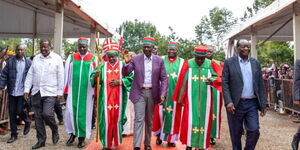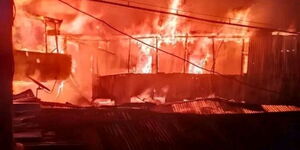Nationwide power outages are not new in Kenya. On Sunday, March 4, the country plunged into darkness that lasted at least three hours.
This was the first major power interruption since President William Ruto took over as the country's head of state.
In 2022, Kenya experienced several cases of nationwide power outages including three consecutive days of blackout in January.
Following the blackouts that were becoming regular, President Uhuru Kenyatta took drastic measures, most of which were executed by then Interior Cabinet secretary Fred Matiang'i.
Kenyans.co.ke revisited measures that the former regime adopted to tame a worrying that was costing the country millions of shillings.
In January 2022, Kenya Power issued a statement notifying its customers that a high-voltage power line had collapsed interrupting power supply across the country.
Days later on January 13 during an interview with Citizen TV, a former Chief Manager at the company revealed that collapsed of the infrastructure was a result of vandalism since it was impossible to guard all the power transmission lines in the country.
“This is a matter of vandalism, people go and sell those parts as scrap metals. Some steel manufacturers buy from these people," he stated.
Treason Charges
In response, President Kenyatta on January 20, ordered the police to arrest and press treason charges against anyone caught vandalising national infrastructure projects.
He further announced a ban on the buying and selling of scrap metal to regulate the industry.
“As of today, we will no longer allow, and have placed a moratorium on, the export or buying and selling of any scrap material until we have established proper guidelines to ensure that material does not come from the hard investments made by Kenyans,” Kenyatta directed.
DCI Arrests
Following Uhuru’s directive, 10 senior managers at Kenya Power were on January 18, arrested and probed on suspicion of negligence and sabotage of the supply of electricity that affected most parts of the country.
On February 3, Matiang'i deployed more security officers to watch over critical infrastructure, which included power systems.
Others were telecommunication sector involving mobile communication, infrastructure systems, communication links, cellular network components, and mobile Internet Networks
Detectives later arrested a prominent businessman from Thika and a former Kenya Power technician in connection with the vandalisation of infrastructure.
Moreover, On March 10, the Directorate of Criminal Investigations (DCI) officers raided a number of homes in Juja, Kiambu County arresting three suspects and recovering property belonging to Kenya Power worth millions.
Among the items recovered during the raid included transformers, transmission conductors, transformers, rolls of aluminium conductors, and assorted materials.
However, in March 2022, Matiang’i revised the scrap metal ban stating that the govt would allow operations for businessmen who applied and qualified for the new licenses.
"We are not going to allow the sector to continue operating in an unlicensed manner and no amount of political intimidation or pressure will make us abandon the resolve.
"We are not constructing infrastructure for scrap metal vandals. "We'd rather the scrap business died, but we were able to protect our critical infrastructure," Mating’i stated.
The ban on scrap metal dealers was later lifted in May 2022, allowing only approved dealers to carry out the business.
The government also announced a Ksh20 million fine upon conviction on individuals found buying and selling of scrap metal without authorisation.
When a massive power outage hit the country on March 4, Kenya Power stated that it was as a result of a system disturbance.
"We have lost bulk power supply in your area due to system disturbance. We are working towards restoration within the shortest time possible. We apologise for the inconvenience caused," the utility firm explained.












